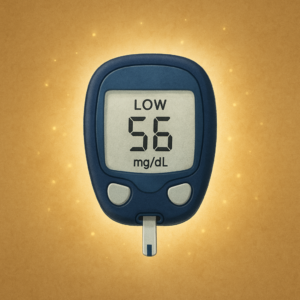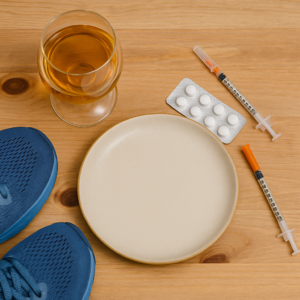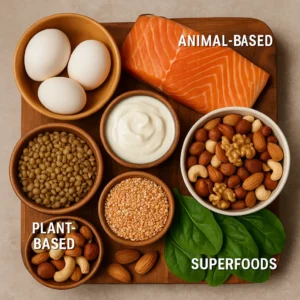Hypoglycemia: Understanding Low Blood Sugar, Symptoms, and Healing Naturally
Have you ever felt a sudden wave of weakness, shaky hands, sweating, or dizziness out of nowhere? For many, it feels scary, confusing, and even frustrating. These sudden “crashes” often go unnoticed or brushed aside as “just tiredness.” But in reality, this could be your body signaling hypoglycemia — a drop in blood sugar levels below normal.
Hypoglycemia is not just about numbers; it’s about your body crying out for fuel. If left unmanaged, it can interfere with daily life, reduce productivity, affect skin and hair glow, and in severe cases, even lead to unconsciousness or seizures.
In this blog, we’ll explore what hypoglycemia is, why it happens, its symptoms, and science-backed ways to prevent and manage it holistically.
🧬 What is Hypoglycemia? (Science in Simple Words)

-
Hypoglycemia means blood sugar levels drop below 70 mg/dL.
-
Glucose is the main source of fuel for your body and brain.
-
When levels fall, your body cannot produce enough energy → leading to warning signals like sweating, dizziness, and mood changes.
-
The brain relies almost exclusively on glucose. That’s why symptoms often show up as confusion, blurred vision, or irritability.
⚡ Causes of Hypoglycemia

Low blood sugar can occur for different reasons:
-
Skipping meals or fasting too long → Without food, glucose levels drop quickly.
-
Excess insulin or diabetes medication → Common in people with diabetes who miscalculate doses.
-
Intense exercise without proper fueling → Muscles burn more glucose, lowering levels rapidly.
-
Alcohol on an empty stomach → Alcohol blocks the liver from releasing stored glucose.
-
Medical conditions → Hormonal imbalances, liver/kidney issues, or certain tumors.
🚨 Symptoms: How Your Body Whispers “Fuel Me”
Hypoglycemia symptoms can be divided into three categories:
Early Signs (Mild Hypoglycemia):
-
Shakiness or trembling
-
Sweating
-
Sudden hunger
-
Dizziness
-
Fast heartbeat
Brain-related Signs (Neuroglycopenic Symptoms):
-
Blurred vision
-
Confusion, difficulty concentrating
-
Irritability or sudden mood swings
-
Slurred speech
-
Severe fatigue
Danger Zone (Severe Hypoglycemia):
-
Seizures
-
Fainting
-
Loss of consciousness
👉 If you experience these symptoms often, it’s not “normal tiredness.” It’s your body asking for help.
💛 Emotional Connection: Living With Low Sugar Episodes
Imagine being at work, in a meeting, or playing with your child, when suddenly your vision blurs, your hands shake, and you feel like fainting. The fear, embarrassment, and helplessness that follow can be overwhelming. Many people silently struggle, unaware it’s hypoglycemia.
By listening to your body’s signals instead of ignoring them, you can prevent serious health risks and regain control of your life.
🍎 Quick Fixes (What To Do Immediately)
If you feel symptoms:
-
Take 15–20g of fast-acting sugar (glucose tablet, juice, candy).
-
Wait 15 minutes → check again.
-
If still low, repeat.
-
Once stable, eat a balanced snack with protein + carbs to prevent another dip.
This “Rule of 15” is recommended by the American Diabetes Association (2022).
🥗 Long-Term Prevention: Science + Holistic Approach
1. Balanced Meals
-
Eat small, frequent meals instead of long gaps.
-
Combine complex carbs + protein + healthy fats (oats + nuts, rice + lentils, roti + paneer).
-
Avoid sudden high-sugar snacks → they spike and crash sugar levels.
2. Smart Exercise
-
Exercise improves insulin sensitivity but can cause hypoglycemia if not fueled well.
-
Have a pre-workout snack (banana, oats, nuts).
-
Post-workout, include carbs + protein to replenish.
3. Manage Stress
-
Stress hormones (cortisol, adrenaline) alter sugar balance.
-
Meditation, yoga, or journaling lowers stress → stabilizes sugar.
4. Sleep Matters
-
Poor sleep increases risk of nighttime hypoglycemia.
-
Stick to a routine: 7–8 hrs of deep sleep.
5. Limit Alcohol
-
Never drink on an empty stomach.
-
Pair alcohol with complex carbs.
🌸 Holistic Healing for Hypoglycemia

Herbal & Natural Support:
-
Ashwagandha: Lowers stress hormones → stabilizes glucose.
-
Fenugreek seeds: Known to regulate blood sugar response.
-
Cinnamon: Improves insulin sensitivity.
Mind-Body Practices:
-
Yoga poses like Balasana (Child’s Pose), Sukhasana (Easy Pose), and Pranayama improve circulation and reduce stress.
-
Mindful eating helps you notice early symptoms.
Skin & Glow Connection:
-
When sugar crashes, your skin looks pale, dull, and tired.
-
Balancing blood sugar = stable energy + natural glow. 🌟
🩺 Who is at Risk?
-
People with diabetes on insulin or medication
-
Children (higher metabolism, smaller meals)
-
Athletes (burn more glucose)
-
Elderly (slower response, less appetite)
🌟 Yeka Wisdom: Listen → Nourish → Glow
Your body is not weak when sugar dips — it’s asking for fuel. Instead of ignoring, honor these whispers. Fuel well, live balanced, and let your inner energy shine as outer glow.
Conclusion
Hypoglycemia is more than a medical condition — it’s a daily reality for many. But with awareness, quick action, and holistic lifestyle changes, it can be managed beautifully.
✨ Remember:
-
Always carry a small sweet.
-
Eat balanced meals.
-
Manage stress and sleep.
-
Listen to your body.
Your glow begins with balance inside. 💛


Leave a Reply